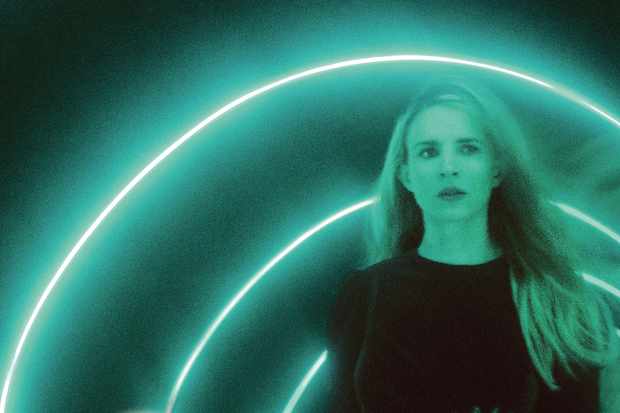Netflix announced they have decided to cancel The OA TV series after two seasons and 16 episodes.
According to Variety, The mystery thriller starred Brit Marling as a blind woman who disappeared seven years ago only to suddenly return with her sight restored. Now referring to herself as The OA, or Original Angel, she then recruits a small team to help rescue other people who have disappeared by opening a portal to another dimension.
Marling co-created the series along with Zal Batmanglij in addition to starring. Both also executive produced along with Brad Pitt, Dede Gardner, Jeremy Kleiner, and Sarah Esberg from Plan B Entertainment and Anonymous Content’s Michael Sugar.
“We are incredibly proud of the 16 mesmerizing chapters of ‘The OA,’ and are grateful to Brit and Zal for sharing their audacious vision and for realizing it through their incredible artistry,” said Cindy Holland, vice president of original content for Netflix. “We look forward to working with them again in the future, in this and perhaps many other dimensions.”
Netflix does not typically release viewership data, with the streamer having said multiple times in the past, however, that they take viewership versus cost into account when deciding whether or not to renew a show. In addition to Marling, the series also starred Emory Cohen, Patrick Gibson, Jason Isaacs, Ian Alexander, Phyllis Smith, Brendan Meyer, Brandon Perea, Will Brill, Sharon Van Etten, Scott Wilson, Alice Krieg, and Paz Vega.
Season 1 of “The OA” debuted in December 2016, while Season 2 debuted nearly three years later in March of this year. The series received mostly positive reviews from critics, with the two eight-episode seasons averaging an 84% critical approval rating on Rotten Tomatoes between them.
The cancellation was revealed almost five months after the second season dropped. We know that Netflix’s renewal decisions are typically made within a month of a season’s release so the reveal that there won’t be a third season isn’t a big surprise.
Here’s the statement Marling made on Instagram:
Dear fans of The OA –
Some of you may know already or some of you may be learning from this letter that Netflix will not be continuing The OA.
Zal and I are deeply sad not to finish this story. The first time I heard the news I had a good cry. So did one of our executives at Netflix who has been with us since the early days when we were sketching out Hap’s basement on the floor of our production office in Queens. It’s been an intense journey for everyone who’s worked on and cared about this story.
Someone once asked me on a panel “why are you so obsessed with sci-fi?” I hadn’t realized I was “obsessed” or even that most of the narratives I’d written to date had been inside the genre of speculative fiction. I was caught off guard. The question had come out a bit like an accusation from someone who didn’t enjoy the genre, so I think I just said something like, “uh…it’s fun to world build?” But I’ve thought about that question a lot since then and I think an answer closer to the truth is this:
It’s hard to be inspired to write stories about the “real” world when you have never felt free in it. As a woman writing characters for myself and other women, it has often felt to me as if the paved roads for travel in narrative are limited. Perhaps one day I will be evolved enough as a writer to pave my own roads in “reality” (Elena Ferrante!), but to date I have often felt stymied.
I can write about the women “on top,” but then I am perpetuating the same hierarchies that oppress us (and just asking to shift the oppression to someone else). I can write about the vast majority of women on the economic bottom, but the power of moving images and charismatic actors often glamorizes or perpetuates the very stereotypes the film hopes to critique. I can write about self-deprecating women who expose the abundant gender inequalities for a good laugh, but then, as Hannah Gatsby said in her brilliant story Nanette, I am in some ways trading my humiliation for my paycheck and the chance to be let in.
Science fiction wiped this “real” world clean like an Etch-a-Sketch. Science fiction said imagine anything in its place. And so we did.
We imagined that the collective is stronger than the individual. We imagined that there is no hero. We imagined that the trees of San Francisco and a giant pacific octopus had voices we could understand and ought to listen to. We imagined humans as one species among many and not necessarily the wisest or most evolved. We imagined movements that got unlikely people in rooms together, got them moving, got them willing to risk vulnerability for the chance to step into another world.
That is what The OA has been for Zal and I and every other artist who joined us. The chance to step into another world and feel free in it. We feel profound gratitude to Netflix and the people we have worked with there for making it possible to make Part I and Part II. We feel proud of those 16 uncompromised hours. In large part, millions upon millions of you have given us this sense of pride by watching – with the comments you’ve left, the art you’ve made, the Reddit theories you’ve sown, the movements you’ve performed in public squares, bedrooms, nightclubs and backyards all over the world.
While we cannot finish this story, I can promise you we will tell others. I haven’t figured out any other effective coping mechanism for being alive in the anthropocene. And maybe, in some ways, it’s okay not to conclude these characters. Steve Winchell will be suspended in time in our imaginations, infinitely evolving, forever running after and finally reaching the ambulance and OA.
With love,
Brit

Leave a Reply